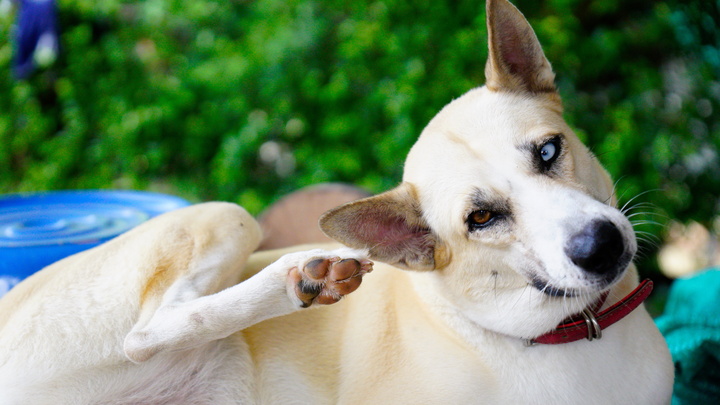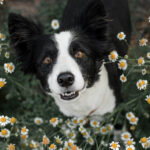Many pet parents—especially new ones—become greatly alarmed when they see their furry friend scratching, especially if the behavior is more than a one-off occasion. The first thing that might run through your mind is that your dog is overrun with fleas or ticks. While this could be the case, there are several other reasons why your dog might be a scratching machine. Here are some to consider and what you can do to make your pup more comfortable.
Allergies. Like humans, dogs can experience seasonal, environmental, and even food allergies that cause itchy skin. Contact with certain substances like chemicals, soaps, detergents, or even certain fabric types can cause allergic reactions or irritation, resulting in scratching. Exposure to irritants such as certain plants, chemicals, or even grooming products can also trigger allergies in sensitive dogs.
Some signs of allergies include scratching and licking – especially the paws – face rubbing, fur loss, red and inflamed skin, recurrent skin infections, and ear infections.
How to help
- Avoid walking your dog when pollen levels are highest in the morning or late afternoon.
- Wipe down paws after a walk, or use dog shoes.
- Run an air purifier in your home.
- Vacuum frequently.
- Wash dog bedding and toys at least once a week.
- Bathe your dog using a hypoallergenic anti-itch shampoo containing soothing ingredients like oatmeal and aloe. Follow up with a gentle and organic skin oil such as evening primrose.
- Use only natural laundry soap and cleaning products in the home and yard.
- Conduct a food sensitivity test to determine which foods your dog is sensitive to.
- Don’t smoke in the home.
- Mix fish or flaxseed oil into your pup’s food to help reduce inflammation.
Dry skin. A number of breeds are prone to dry skin, which can cause your furry friend to scratch. These breeds include.
- Retriever – Retreivers love water and have a very short coat. Spending a lot of time in the water strips natural oils from the coat, which causes dry skin.
- German shepherd – Shepherds are prone to allergies, which cause dry and itchy skin and seasonal dry skin.
- Bulldog –Skin wrinkles and folds trap moisture, which, if not cleaned frequently, causes irritation and dry skin.
- Shih Tzu. Shih Tzus have a long, flowing coat that requires regular grooming to prevent mats, tangles, and dry skin.
- Pugs – Like bulldogs, pugs have loads of wrinkles and very short hair, harboring moisture and bacteria, leading to dry and irritated skin.
- Chihuahua. Chihuahuas can have sensitive skin and are prone to dryness, especially if exposed to harsh weather conditions.
- Schnauzer. Schnauzers may experience dry skin issues, particularly in their beard area, which requires regular cleaning and moisturizing.
- Dachshund. Their short, smooth coat can make Dachshunds susceptible to dry skin, especially in cold or dry climates.
- Boxers. This breed is prone to hypothyroidism, which in turn can cause issues with dry skin and also cause hair to fall out.
How to help
- Massage some olive oil into your dog’s coat before swimming.
- Rub coconut oil into paws and spread on any areas of raw or inflamed skin to promote healing.
- Use a humidifier in dry climates or in the winter.
- Keep up on grooming.
- Don’t over-bathe – consider a natural waterless bathing product for dogs with exceptionally dry skin.
- Have a yearly wellness check to ensure your pup is not suffering from an underlying health condition.
- Dilute one part apple cider with three parts water and use it as a rinse after bathing. Apple cider helps to restore the skin’s natural pH balance and relieve itchiness.
- Use a soft brush to remove dead skin cells and redistribute natural oils.
Fleas and ticks. Even a flea bite or tick can cause some dogs to set off a five-alarm scratching session, leading to irritated and painful hot spots. If left untreated, hot spots can lead to skin infections, further intensifying pain and itching.
How to help
- Use a natural flea and tick spray in your yard.
- Use a natural flea and tick collar and coat spray, usually made with essential oils such as lavender, citronella, and cedarwood.
- Keep your lawn cut short.
- If you visit an area with a lot of brush or trees, check your pet carefully for fleas and ticks—using a flea comb.
Stress and anxiety
Stress and anxiety in dogs can manifest in various ways. They may be caused by a range of factors, including changes in routine, loud noises, separation from pet parents, unfamiliar environments, or past traumatic experiences. Along with licking, chewing, and shedding, scratching indicates that your pup may need help relaxing.
How to help
- Recognizing your pup’s stress triggers is essential for addressing its needs and providing appropriate support.
- Some high-anxiety dogs respond well to stress-relieving treats that contain natural relaxing ingredients.
- Provide your dog with a quiet, comfortable retreat where they can relax and feel safe. Many dogs feel secure in a cozy crate -just don’t lock the door when you are home, and they will most likely retreat to this place when feeling stressed.
- Dogs thrive on routine, such as a consistent daily schedule for feeding, exercise, and rest. Predictability can help reduce anxiety by providing structure and stability in your furry friend’s life.
- Diffuse soothing essential oils such as lavender or chamomile.
- Avoid using punishment or harsh methods to calm your pet, worsening their fear and leading to further behavioral problems. Instead, focus on positive reinforcement and comfort.
- If scratching is severe, consider using booties to keep your pet from breaking its skin.
Skin infections
Once the outer layer of the skin becomes compromised, it creates an opportunistic environment for infection. The immune system responds by sending white blood cells to the area. Scabs, crusts, and lesions may form, which quickly become itchy. Scratching further complicates the problem because it breaks the scabs and introduces bacteria and fungi to the skin via paws and nails.
How to help
- If your pup is scratching due to a skin infection, it is essential to determine the cause and seek appropriate treatment.
- Use a cone or booties to keep your pup from scratching scabs.
More ways to help your canine companion
Put soft booties on your pup when itching becomes a problem – this will keep them from digging into their skin. A cone may be necessary until the skin heals and reduces inflammation.
If your pup’s scratching persists after you try to remedy it yourself, seek professional help. Veterinarians may prescribe antihistamines, steroids, or allergy shots to help calm irritated skin.






